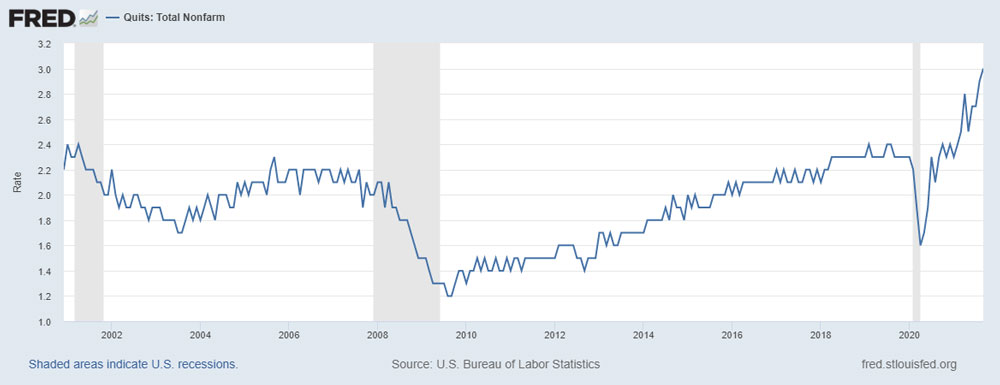
Finding good employees has always been a challenge – but these days it’s harder than ever. And it is unlikely to improve anytime soon.
The so-called quit rate – the share of workers who voluntarily leave their jobs – hit a new record of 3% in September 2021, according to the latest data available from the Bureau of Labor and Statistics. The rate was highest in the leisure and hospitality sector, where 6.4% of workers quit their jobs in September. In all, 20.2 million workers left their employers from May through September.
Companies are feeling the effects. In August 2021, a survey found that 73% of 380 employers in North America were having difficulty attracting employees – three times the share that said so the previous year. And 70% expect this difficulty to persist into 2022.
Observers have blamed a wide variety of factors for all the turnover, from fear of contracting COVID-19 by mixing with co-workers on the job to paltry wages and benefits being offered.
As a professor of human resource management, I examine how employment and the work environment have changed over time and the impact this has on organizations and communities. While the current resignation behavior may seem like a new trend, data shows employee turnover has been rising steadily for the past decade and may simply be the new normal employers are going to have to get used to.

The share of workers who are voluntarily quitting their jobs reached a record level in September at 3%. (FRED)
The economy’s seismic shifts
The U.S. – alongside other advanced economies – has been moving away from a focus on productive sectors like manufacturing to a service-based economy for decades.
In recent years, the service sector accounted for about 86% of all employment in the U.S. and 79% of all economic growth.
That change has been seismic for employers. A majority of the jobs in service-based industries require only generalizable occupational skills such as competencies in computing and communications that are often easily transportable across companies. This is true across a wide range of professions, from accountants and engineers to truck drivers and customer services representatives. As a result, in service-based economies, it is relatively easy for employees to move between companies and maintain their productivity.
And thanks to information technology and social media, it has never been easier for employees to find out about new job opportunities anywhere in the world. The growing prevalence of remote working also means that in some cases employees will no longer need to physically relocate to start a new job.
Thus, the barriers and transition costs employees incur when switching employers have been reduced.
Greater options and lower costs to move mean that employees can be more selective and focus on picking jobs that best fit their personal needs and desires. What people want from work is inherently shaped by their cultural values and life situation. The U.S. labor market is expected to become far more diverse going forward in terms of gender, ethnicity and age. Thus, employers that cannot provide greater flexibility and variety in their working environment will struggle to attract and retain workers.
Employers now have a greater obligation than in the past to convince existing and would-be employees why they should stay or join their organizations. And there is no evidence to suggest this trend will change going forward.
What companies can do to adapt
It has been estimated that the cost to the employer of replacing a departing employee is on average 122% of that employee’s annual salary in terms of finding and training a replacement.
Thus, there is a large incentive for businesses to adapt to the new labor market conditions and develop innovative approaches to keeping workers happy and in their jobs.
A May 2021 survey found that 54% of employees surveyed from around the world would consider leaving their job if they were not afforded some form of flexibility in where and when they work.
Given the heightened priority employees place on finding a job that fits their preferences, companies need to adopt a more holistic approach to the types of rewards they provide. It’s also important that they tailor the types of financial, social and developmental incentives and opportunities they provide to individual employees’ preferences. It’s not just about paying workers more. There are even examples of companies providing employees the choice of simply being paid in a cryptocurrency like bitcoin as an inducement.
While customizing the package of rewards each employees receives may potentially increase an organization’s administrative costs, this investment can help retain a highly engaged workforce.
Managing the new normal
Companies should also plan on high employee mobility to be endemic and reframe how they approach managing their workers.
One way to do this is by investing deeply in external relationships that help ensure consistent access to high-quality talent. This can include enhancing the relationships they have with educational institutions and former employees.
For example, many organizations have adopted alumni programs that specifically recruit former employees to rejoin.
These former employees are often less expensive to recruit, bring access to needed human capital and possess both an understanding of an organization’s processes and an appreciation of the organization’s culture.
The quit rate is likely to stay elevated for some time to come. The sooner employers accept that and adapt, the better they’ll be at managing the new normal.
![]()
Ian O. Williamson is Dean of the Paul Merage School of Business at the University of California at Irvine.
![]()
![]()





























Every Day I'm Shuffling says
I’ve always thought about nonprofits who cannot pay their employees well and how they need to embrace this idea of motivating their employees to contribute ideas and innovation, providing access to career development all knowing that they might leave soon and that the benefit is that they will be phenomenal performers while gaining experience and that a higher percentage will stay for the long haul.
I recently left a job because there was inadequate consideration of environmental and economic change requiring us to do things differently. Front line staff were left out of major, career-impacting decisions, and the department struggled with change precisely due to a lack of staff involvement. Opportunity to progress was short changed for many of the talented staff, because senior leadership wasn’t gleaning insight from them, and instead, leadership would consider organizational changes that wouldn’t likely solve the problem. That, and the senior leadership opted to outsource talent to solve the major issues rather than investing a short amount of time training current employees on the internal operational issues they would need to know in order to advance.
In short, when an employer isn’t terribly interested in investing in its employees and isn’t interested in how those employees can invest in the development of the mission, why would the employees stay? Employees want their work to have impact and meaning, but if the employer doesn’t share the vision and isn’t as interested in progress, the employees feel like they are spinning their wheels. Time to move on.
Timothy Patrick Welch says
Since some companies are closing local concerns and off-shoring for cheaper labor, and friendlier business environments, it must be hard to inspire their workforce. Loyal long-term employees are retiring and leaving a gap of knowledge and experience that is sometimes hard to fill. The incoming generation has learned that their position may only be temporary and may be reluctant to dedicate their lives to companies that seek profit over obligations to their workers and their local community.
Companies that are too big to fail should be broken up.
No Job says
I once worked in a factory up north 40 years ago. You couldn’t talk, take bathroom break, sit down, or ask for a raise… Got paid $2.75/hr.
Oh the Good old Days !!!!!
FlaPharmTech says
Florida state registered pharmacy technician working at your friendly Palm Coast Publix here. We are drowning, in case you care. I’m exploring any and all options to get out of my current COVID heavy work arrangement. When we break, mucho lucko getting your flipping drugs. And breaking we are. Call Publix corporate and ask why your Palm Coast Publix pharmacy is not adequately staffed. BTW, I make $15 per hour, and that’s with a few years experience. Publix dropped my health insurance for 2021 as the initial COVID lockdown negatively impacted my hours by a wowza huge 84 hours to qualify. Yeah, Publix’s color is GREEN. What else is GREEN? Money. Off of the backs of their employees…
David J Castello says
That’s horrible, but not surprising. Employees across the country are rebelling. When CEOs are making 320X more than their average employee, the system will eventually self-destruct. Even worse? Golden parachutes for CEOs for poor performance. History shows that the system never changes because those on the top of the food chain suddenly developed a conscience.
Sherry says
Dear FlaPharmTech. . . So very, very sorry for your situation and your treatment by Publix! Disgraceful!
I do hope you find much better employment soon.
Employees across many industries have suffered stagnant wages and benefits along with the detriment caused by “at will” employment regulations for many years now. Although I’m now retired, as a professional recruiter, I’m delighted to hear that employees finally have a bit of leverage that will help them into better jobs.
A.j says
WOW, America is falling from demanding demanding all work low pay, and little to no benifits. March on workers March on. Let cooperate America know we don’t need them, but they need us.
Sherry says
Just thought you all should be reminded that Publix is a HUGE supporter of Republican politicians:
https://www.opensecrets.org/orgs/publix-super-markets/summary?id=D000028488